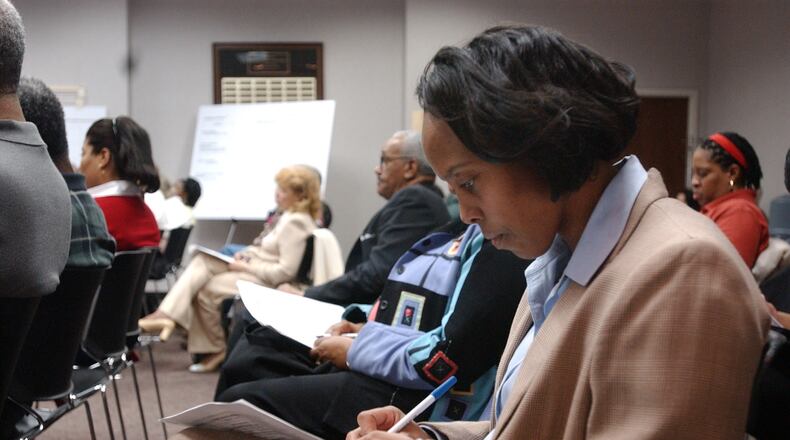A Fulton County judge has sued her clerk of court, asking that she be compelled to perform duties that the judge said are not being done.
Chief Magistrate Judge Cassandra Kirk filed the suit last week against Superior Court Clerk Cathelene "Tina" Robinson, saying that she was not performing the duties she agreed to when she was appointed to take over magistrate court responsibilities in 2016.
Both Kirk and Robinson are elected officials.
The Magistrate Court is responsible for everything from evictions and first appearance hearings to garnishments and abandoned motor vehicles.
“It’s incredibly frustrating,” Kirk said of her issues with Robinson. “It’s difficult to imagine that citizens are getting the best, and that is what I believe they deserve.”
Kirk said Robinson has directed magistrate employees to do Superior Court work, and those actions have presented significant obstacles for the Magistrate Court. They include delays answering phone calls and processing documents. The clerk’s setup requires people who need magistrate services to go between three different locations, Kirk said.
The challenges mean unnecessary confusion and bureaucratic challenges for people accessing the court, she said, and have led to missed court dates and other missed deadlines.
Kirk and Robinson have twice been through mediation to deal with the complaints, and have had other meetings and interventions since 2017. Filing the legal request, Kirk said, was a last resort to try to fix a number of issues that lead to inefficiencies in the court system.
“At this point, my hands are tied,” she said.
But Robinson’s attorneys disagreed, saying that Robinson has made “every effort” to work and collaborate with Kirk. In an email, attorney George Lawson said Kirk was mistaken in her belief that she had any ability to supervise either Robinson or the clerk of court’s budget.
“Magistrate Judge Kirk obviously has some other hidden agenda that Ms. Robinson has no knowledge of nor control over,” Lawson wrote. Kirk denied that she did.
Robert James, the former DeKalb County district attorney, said cases of judges suing their clerks is “highly unusual.” Typically, he said, a magistrate clerk would be subordinate to a judge. But it’s different when both are elected officials.
The lawsuit, he said, is the “nuclear option.”
“If the chief judge feels or believes that the clerk is not fulfilling her responsibilities according to law, she has a responsibility to do something about it,” he said. “Ultimately, it’s the people who suffer.”
Magistrate Court, James said, touches a lot of people. If its operations aren’t running smoothly, he said, the rights of a number of people are compromised.
“If things aren’t being done the way they ought to be done in Magistrate Court, it’s of extreme importance,” he said.
But Bill Stone, an attorney who has represented clerks in the past, said Kirk’s suit is “just dead on arrival.”
“Nobody has the right to micromanage the way the clerk does her job,” Stone said. “She’s charged with getting the work done.”
Kirk’s suit said that Robinson’s magistrate duties “exclusively consist” of those assigned by the judge, something Lawson denied.
Stone said the case would end up being more of a political issue than a legal one. Fulton County commissioners directed Robinson to take on the magistrate duties, and Kirk does not have the ability to choose a different clerk.
Marvin Arrington, a Fulton County commissioner, said he was hopeful the pair would be able to resolve their differences. Both Kirk and Robinson are “reasonable people,” he said.
“The rub is the clerk is an elected clerk, and she’s a constitutional officer,” Arrington said. “In her department, in what she’s elected to do, she’s got full control.”
About the Author
The Latest
Featured


